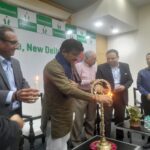Timely diagnosis and treatment imperative during a heart attack
‘Heart attack guidance for physicians: When to suspect, how to diagnose, what to do?’ a comprehensive guidebook by Dr KK Aggarwal and Dr Sundeep Mishra published in the Indian Heart Journal
New Delhi, April 23, 2017: Cerebrovascular diseases have become the number one cause of mortality and morbidity in India. Among these, heart attack is one of the most serious conditions associated with very high morbidity and death rate. General practitioners must recognize the signs early on in order to bring down the high complication rate and follow it up with proper treatment by certified cardiologists.
An instructive document titled ‘Heart attack guidance for physicians: When to suspect, how to diagnose, what to do?’ has been published by Dr KK Aggarwal, National President of the Indian Medical Association and Prof. Sundeep Mishra, Professor of Cardiology at AIIMS in the special STEMI Supplement of the Indian Heart Journal. It provides simple guidance on how to suspect and diagnose a heart attack, early treatment, and when to refer a patient with this condition. This information is important not only clinically but from the medico-legal standpoint as well because any delay can worsen survival and even result in death.
Speaking on the subject, Padma Shri Awardee Dr KK Aggarwal, National President Indian Medical Association (IMA) and President Heart Care Foundation of India (HCFI) said, “Heart attack, particularly STEMI, can be totally reversible if diagnosed and treated early. The adage ‘Time is Muscle’ is extremely relevant in the diagnosis and treatment of this disease. The door-to-balloon time when a heart attack patient arrives in the emergency room until percutaneous coronary intervention is performed to restore blood flow also needs to be considered by physicians. It is therefore important that physicians be trained to recognize any such symptoms right at the onset such that the appropriate guidance can be given without losing out on precious time.”
There is severe chest discomfort during a heart attack. Deaths occur due to abnormal heart rhythm (ventricular fibrillation) due to electrical instability of the heart or heart failure due to massive heart attack. Occasionally, a heart attack can cause a heart muscle to rupture and this can prove fatal.
Adding to this, Prof. Sundeep Mishra, Professor of Cardiology at AIIMS and Editor, Indian Heart Journal said, ” It is very important for the first-contact physicians to suspect a heart attack early on, confirm it through an ECG as soon as possible, and refer the patient for revascularization to a center that is better equipped. This is where clear cut guidance for physicians regarding when to suspect a heart attack, how to confirm it, and how to proceed when a diagnosis is made assumes utmost importance and the instructive document will be like a comprehensive guide to this and more.”
Following are the signs and symptoms of a heart attack.
- Pain areas: in the area between shoulder blades, arm, chest, chest, jaw, left arm, or upper abdomen
- Pain types: can be crushing, like a clenched fist in the chest, radiating from the chest, sudden in the chest, or mild
- Pain circumstances: can occur during rest
- Whole body: dizziness, fatigue, light-headedness, clammy skin, cold sweat, or sweating
- Gastrointestinal: heartburn, indigestion, nausea, or vomiting
- Chest: discomfort, fullness, or tightness
- Neck: discomfort or tightness
- Arm: discomfort or tightness
- Also common are anxiety, feeling of impending doom, sensation of an abnormal heartbeat, shortness of breath, or shoulder discomfort.
Physicians must also raise awareness about the preventable aspect of heart disease. Simple lifestyle modifications such as consuming a healthy diet, exercising regularly, cessation of alcohol consumption and smoking and effective stress management techniques can go a long way in helping reduce the risk of heart attacks.








I haven¦t checked in here for some time because I thought it was getting boring, but the last several posts are great quality so I guess I will add you back to my daily bloglist. You deserve it my friend 🙂
http://www.corburterilio.com/
Hey, you used to write fantastic, but the last few posts have been kinda boring?K I miss your tremendous writings. Past several posts are just a little bit out of track! come on!
http://www.borvestinkral.com/
Simply wanna input that you have a very decent website , I like the layout it really stands out.
http://www.borvestinkral.com/